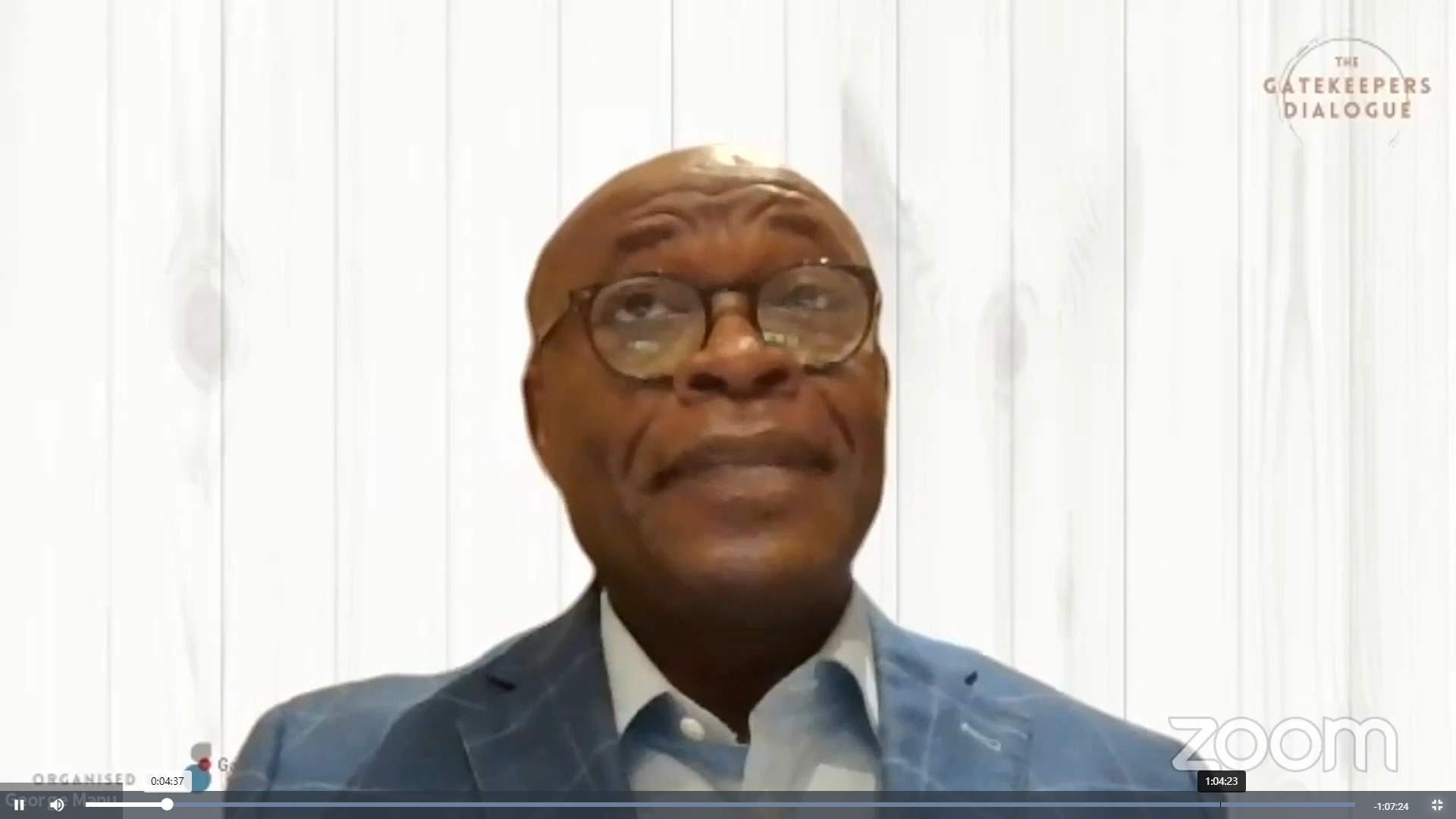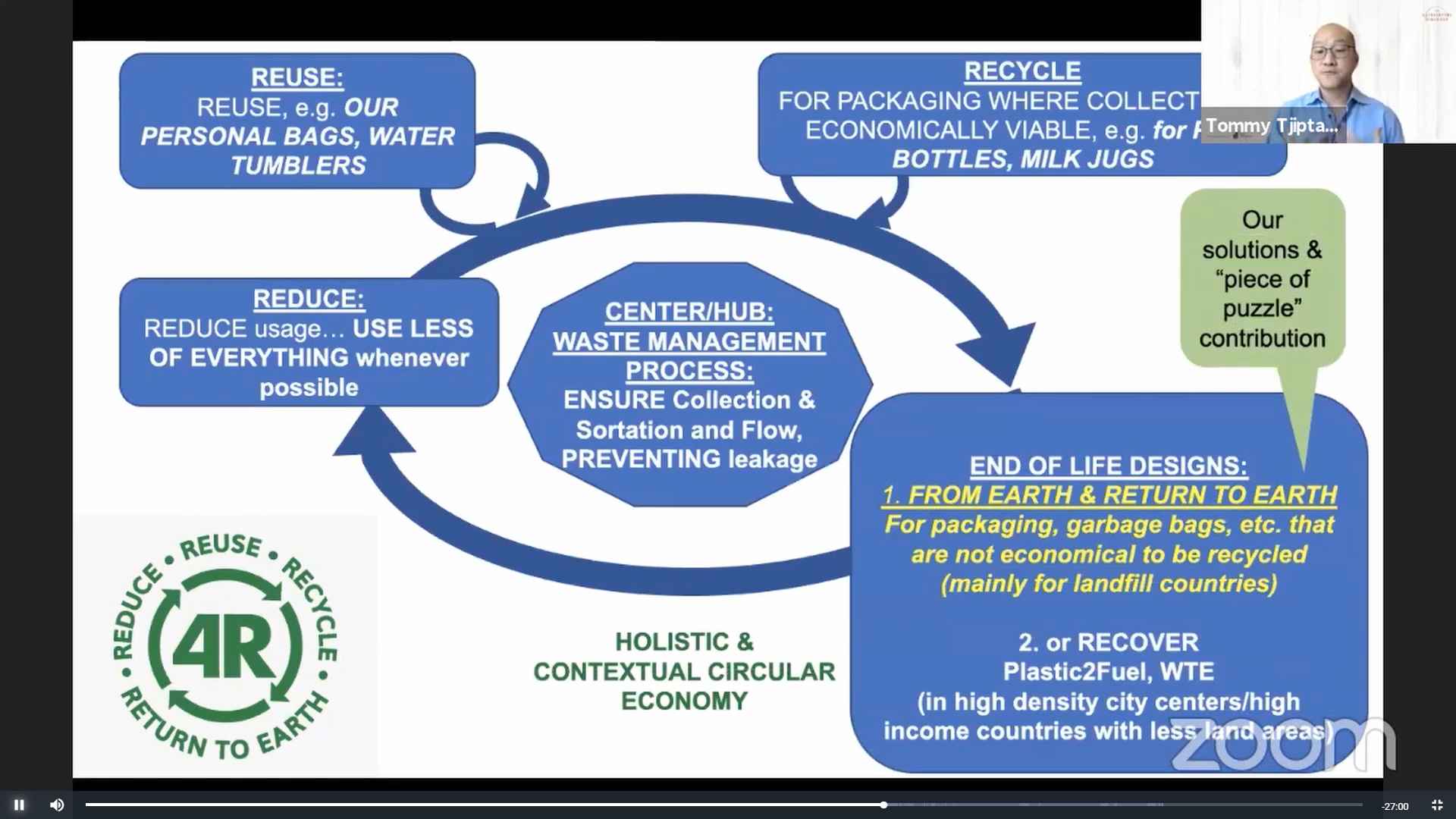“Business in the Bible is intended for the welfare of the people”: Sustainability leaders at The Gatekeepers Dialogue
In this series on The Gatekeepers Dialogue, Salt&Light interviews leaders who provide a biblical worldview of global issues that will be highlighted at the next World Economic Forum.
by Christine Leow // August 23, 2021, 4:29 pm

God created business not just to be profitable but to do good, say speakers Dr George Manu and Mr Tommy Tjiptadjaja at The Gatekeepers Dialogue. Photo by Noah Buscher on Unsplash.
“When I was in business school in the UK in the 80s, conventional wisdom of the time was that business exists to maximise shareholder value.
“It’s changed since then. Now, business exists not just to maximise shareholder value but also to address stakeholder interests – the interest of the customers, employees, the society in which they operate, and people at large,” said Dr George Manu, Partner and Head of International Development Advisory Services at KPMG in East Africa.
Dr Manu was speaking on the subject of “Business for good and sustainability in the developing world” at The Gatekeepers Dialogue (August 12-13).

(Clockwise from top left) Dr George Manu and moderator Max Jaganathan with Mr Tommy Tjiptadjaja discussing Business for Good and Sustainability in the Developing World. Screengrab of The Gatekeepers Dialogue.
This shift has brought business back to what it was meant to be all along – a God-given means of doing good, emphasised co-speakers Dr Manu and Tommy Tjiptadjaja, CEO and co-founder of Greenhope, a social enterprise dedicated to creating packaging from renewable resources as a biodegradable solution to plastic waste.
Alongside this was also the idea that doing business need not be at odds with being godly. Instead, it is actually a way of living out God’s mandate to work the earth and take care of it (Genesis 2:15).
The two men spoke about how God can be evident in the marketplace with the practice of ESG – Environmental, Social and Governance – and how this not only benefits the earth and society at large but also the bottomline of businesses.
Wealth is meant for welfare
When God created man, He also gave us the ability to do business and produce wealth (Deuteronomy 8:18), said Dr Manu.
“Business in the Bible is intended by God to be used for good.”
In fact, the Bible has accounts of business principles at work. When Elisha encountered a widow whose two sons were at risk of becoming slaves because they could not pay off their debts (2 Kings 4:1-7), the prophet asked the widow: “Tell me, what do you have in the house?”
“That alone is a business principle – you start with what you have,” said Dr Manu of the account of how the prophet helped the widow start a miraculous oil business.
“This widow became a business woman and created wealth for good, and sustained her family and paid off her creditor.
“Business in the Bible is intended by God to be used for good.”
This good can be accomplished by incorporating ESG into business.
“Joseph’s advice to the Pharaoh is good stewardship and governance at work.”
Drawing from Genesis, Dr Manu noted that environmental care was incorporated into God’s mandate to Adam to “be fruitful and multiply, fill the earth and subdue it, have dominion over it” (Genesis 1:28),
“Man was given authority, given this command to multiply, to trade, to use those talents”
In the same way, the account of Joseph’s management of the harvest in Egypt was a picture of ESG at work.
“Joseph’s advice to the Pharaoh to appoint commissioners to manage the harvest – taking a fifth of the harvest to store and release during the years of famine – what we’re seeing is good stewardship and governance at work.
“We are also seeing sustainability – how do we sustain a whole people, a whole generation so that during the seven years of famine, nobody starved. In fact, people came from elsewhere to buy food from Egypt.
“And in the sustainability is the social, because during the seven years of famine, the society was looked after.”
Companies that do well and do good
Businesses today can continue the good that God intended by incorporating ESG into their ethos and raison d’être, Dr Manu encouraged.
“The whole way of operating of the company has to consider what it does for the environment, for the society in which it operates and for governance, not just the internal mechanisms and control of the business but also compliance with external bodies.”
“Businesses can follow sustainable practices and still be successful.”
Companies also need to “build greater capacity and knowledge of ESG right from the top – senior management all the way down”.
There are successful companies which have been able to both do well and do good, said Dr Manu.
In Kenya, where he is based, Bamburi Cement had been mining limestones for years to produce cement. What was left behind after the mining was a desolate quarry of about 200 hectares.
Instead of leaving the area a wasteland, the company turned the quarry into a nature park, Haller Park.
“The park attracts 160,000 visitors every year. It has about 30 species of mammals, 160 species of birds, hosts a variety of wildlife as well as all kinds of trees.

Business can do good by focussing on ESG and this can be done without compromising profits, said Dr George Manu. Screengrab of The Gatekeepers Dialogue.
“This is an example of how you can develop sustainable initiatives.”
Another company in Kenya, M-KOPA, provides off-grid, pay-as-you-go solar power to communities that are not connected to the electricity grid.
“Across East Africa, there are over one million subscribers connected to this company,” said Dr Manu. “Millions of users are benefitting from this. It is clean for the environment, has no carbon emission, is sustainable.
“God says, ‘Take care of my creation, use it, multiply it.’ It becomes a command.”
“Clearly, businesses can follow sustainable practices and still be successful.”
While one need not be a believer to buy into ESG, it helps, said Dr Manu in answer to a question by a participant on whether Christianity was essential to supporting ESG.
“Religion guides us and is the driving force for people’s behaviour. When you are a Christian, it is even more pronounced.
“Your whole life, lifestyle, thought processes, all your actions are all guided by God and what the Bible has to say.
“The Bible backs (ESG). God says, ‘Take care of my creation, use it, multiply it.’ It becomes a command. Being a Christian gives me greater impetus, it becomes the standard.”
Sustainability is profitable
On the perspective of profitability, Dr Manu said: “It’s easy to think that ESG is too expensive and that if you follow ESG, profits will dip.
“But studies have been done recently to suggest the opposite. Companies that embed ESG in their operations can be more profitable.”
Citing the parable of the talents, he said that growing wealth is encouraged by God because the one who multiplied the talents was praised and called a “good and faithful servant”. The one who did nothing was described as “wicked”.
Sri Lankan lingerie and sportswear company, MAS, is one such example, said Dr Manu.
“Companies that embed ESG in their operations can be more profitable.”
MAS has 52 manufacturing facilities across 17 countries. Most of its workers are women and the company has an empower programme that provides education, awareness and skills development for them.
“They produce mostly for big brands and these big brands prefer to work with such companies than those who are cheaper but do not have a good record of ESG.”
Apart from strong client relations, companies like MAS do better because they have higher employee productivity since their workers receive skills training, and there is a lower turnover because employees do not want to go elsewhere. Such a company has a bigger “social licence” to operate because they are doing good, explained Dr Manu.
Unilever is another hugely successful company that is known for its ESG commitments.
They have committed to, among other things, zero emissions by 2030, 100% sustainable sourcing of their key agricultural crops, empowering of famers and small holders to protect and regenerate entrepreneurship, halving food waste by 2025, employing 25% of people with disability by 2025 and equipping 10 million young people with essential skills by 2030.
“This is something they do right across the company and the company remains profitable.”
Man as stewards of God’s creation
For Mr Tjiptadjaja, being an entrepreneur with a business hinging on sustainability is part of his “redeemed purpose in this short, earthly life”.
Man’s original mandate by God was to work the earth and take care of it, which is what sustainability is about.
“We love to work (the land) but we always forget to take care of it. God always wants the whole package.

Mr Tommy Tjiptadjaja considers sustainability in business a way to live out the original mandate God gave man to work the earth and care for it. Screengrab of The Gatekeepers Dialogue.
“We are stewards, never owners to protect us, to shelter us from the extreme – doing well and (becoming) prideful, or if not doing well, we lose hope.
“We love to work it but we always forget to take care of it. God always wants the whole package.”
“If we are stewards, we have more freedom to really handle that.”
God is in the business of repentance, redemption and reconciliation, and restoration.
This includes our relationship with Him, with each other and with creation, added Mr Tjiptadjaja.
“You cannot have human flourishing, thriving or the understanding of God the Creator without harmony with nature.”
Seen in this light, the care of creation “gives me meaning to what we are doing”, he said.
Sustainability demonstrates God’s love
“ESG is often dismissed as a developed country, or high-income country, phenomenon. However, the principles apply globally.
“We are all called to address the environment, social and governance issues to sustain our planet,” said Dr Manu.
Agreed Mr Tjiptadjaja: “Sustainability is a systemic issue related to all aspects of life, affecting all people.”
“We are not talking about CSR in sustainability. The business model itself has to be regenerative for environment and society.”
This is a great opportunity for everyone – companies, NGOs, governments – to work together to show “solidarity in humanity and reach out to people of different faiths, demonstrating our God’s love, justice and mercy”.
For example, there are microplastics in our water and seafood from plastic waste pollution. Research has shown that we eat a credit card’s worth of plastic each week as a result.
“If we turn a blind eye or deny this, we are saying we don’t care about people. Where is our God in this issue?”
This is why his organisation, Greenhope, has stepped into this space to provide an alternative to plastics.
“There is no silver bullet in this plastic issue,” he admitted.
Each effort to cut down plastic waste – recycling, use of biodegradable plastics, ban on single-use plastic – has its pitfalls.
What Greenhope does is to reduce, reuse and recycle where possible and to use their proprietary bioplastics for packaging and garbage bags which are “too dirty, too flimsy to recycle”.

Greenhope functions on a “redemptive model” of business where sustainability is the aim. Over and above the 3Rs, it offers bioplastics that can help reduce plastic waste. Screengrab of The Gatekeepers Dialogue.
“This is an example of what a regenerative business model is. We are not talking about CSR in sustainability. The business model itself has to be regenerative for the environment and society.”
The starch used to make their bioplastics come from farmers. The resulting bioresin is taken to factories to be turned into different products where “the waste is not negative to the earth”.
He calls this a “redemptive business model” because, should demand increase, the benefit goes to the farmers in a complete cycle.
The way forward for businesses
Consumption and production will only increase. This is a great opportunity for businesses.
With sustainability, businesses can convert that “massive demand” into a better version with better alternatives and better technology, said Mr Tjiptadjaja.
“True entrepreneurship is about value creation, solving real problems. The bigger the problem, the bigger the value creation.”
“True entrepreneurship is about value creation, solving real problems. The bigger the problem, the bigger the value creation.
“And profit is a function of value capture, depending on how much value we can create and how much we can defend that value.”
There is no better time than now to move into sustainability because the generation of young people – millennials – have been lobbying for more to be done to save their future planet, he said.
“This creates a ripple effect upstream on the value chain actors. Investors see this trend and they are moving.
“All the money is pouring in. All the governments are trying to solve this (sustainability issue).”
Global businesses, added Dr Manu, are moving in that direction as well. Some 2,000 of them have committed to ESG which is now “on the agenda of every major business”.
The future for businesses, then, is to make ESG integral to their plans.
The Gatekeepers Dialogue, organised by Gatekeepers (Singapore), brings together Christian leaders across disciplines from different nations as an ekklesia to discern, share and address contemporary Environment, Social, and Governance (ESG) issues from a Biblical context.
MORE REPORTS FROM THE GATEKEEPERS DIALOGUE:
We are an independent, non-profit organisation that relies on the generosity of our readers, such as yourself, to continue serving the kingdom. Every dollar donated goes directly back into our editorial coverage.
Would you consider partnering with us in our kingdom work by supporting us financially, either as a one-off donation, or a recurring pledge?
Support Salt&Light


